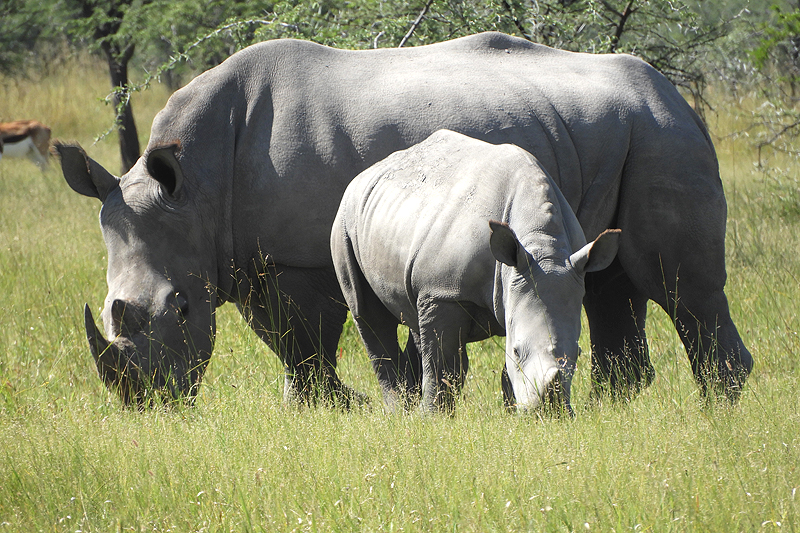.
In Namibia, a case of rhino poaching has sparked a storm of indignation. In the private nature reserve of Ghaub in the Otavi Mountains in northern central Namibia, poachers killed two white rhino cows and a calf in mid-May. They hacked off the horns of a cow. Apparently the animal was still alive at the time. When its carcass was found, dung covered its eye, which the poachers must have placed there.
Despite an intensive search, the calf of this cow was only discovered deep in the bush two weeks later. A gunshot wound in the hind leg may have caused a slow death. The poachers shot the second cow in the stomach. The rhino ran away and died three miles away in the bush. According to the tracks, it had frequently rubbed itself against tree trunks, probably to get rid of the pain.
Moving letter to the public
Deeply shaken, the owners addressed themselves in a personal letter to the public. They had bottle-raised the first rhino cow after it had lost her mother at the age of three months. The fact that it gave birth to a calf a year ago and looked after it just like other cows was a particular joy and consolation for the owners during the Corona crisis.
According to them, Ghaub has invested in wildlife protection for years. Specially trained guards track down the rhinos every day. They also check the nature reserve for possible tracks of intruders. The thoroughfare is secured by guarded gates.
Hardly any income due to Corona
Ghaub does not dehorn the rhinos because poachers also kill the animals for the stump. In addition, the anesthetic means high stress for the animals and carries the risk of overdosing. Since the horn grows back quickly, it would have to be trimmed once a year.
Ghaub finances the protective measures through income from its guest business. On round trips and tracking tours, guests of the lodge and campsite on Ghaub can experience the pachyderms up close – without a fence separating them. This income has been missing since the beginning of the Corona crisis in March 2020. The protection of rhinos and other game must be financed from reserves or loans.
Insurance company refuses to pay
As explained in court in March, Ghaub is insured against business failure due to pandemics. However, the insurance company refuses to pay. It demands “legal certainty”, although courts in South Africa have already ruled in favor of the insured in similar cases. Since Namibia’s courts are completely overloaded, the verdict can be years in coming.
Since the beginning of the Corona crisis, experts have been warning of the consequences for nature conservation, because tourism is a major source of funding and thousands of people are losing their jobs. According to the Ministry of the Environment, the poaching of rhinos in Namibia declined in 2020 – with 30 poached animals discovered compared to 50 in the previous year. However, the decline is also attributed to the corona restrictions, which have now been relaxed.
This report was published, in a slightly modified form, with further news stories on travel and nature in Namibia, in the column “Reise Aktuell” in the print edition of Namibiamagazin no. 2/2021 (in German only).
For more details about the poaching of rhinos on Ghaub see the news story “Rhinos poached on Ghaub” on the website of the umbrella company ONE Namibia to which Ghaub belongs.
.

The rhino cow and its calf one month before their death. Photo: Ghaub Nature Reserve & Farm
